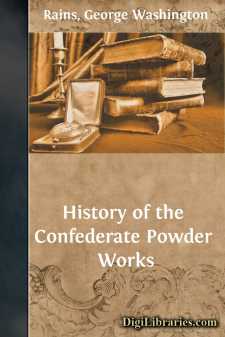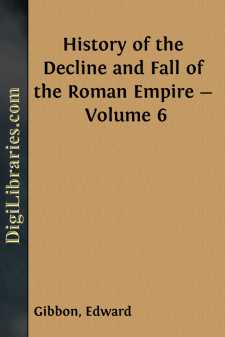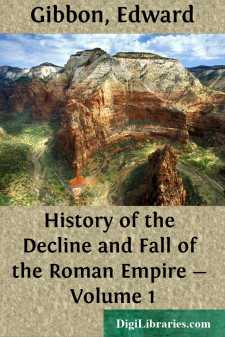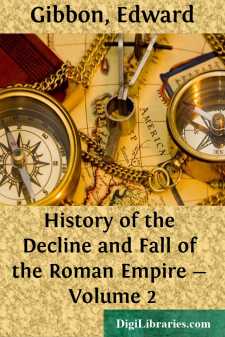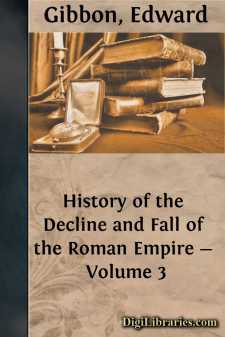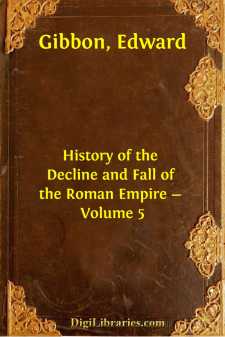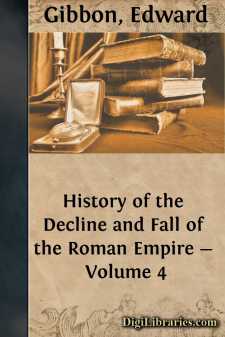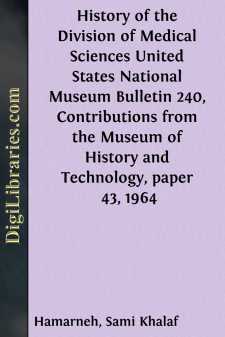History
- Africa 30
- Americas (North Central South West Indies) 50
- Ancient 68
- Asia 58
- Australia & New Zealand 8
- Canada 41
- Caribbean & West Indies 1
- Civilization 20
- Eastern Europe 12
- Europe 310
- Expeditions & Discoveries 60
- General 77
- Historical Geography 1
- Jewish 9
- Latin America 3
- Medieval 8
- Middle East 13
- Military 248
- Revolutionary 8
- Study & Teaching 5
- United States 353
- Western Europe 56
- World 13
History Books
Sort by:
In accepting your invitation to address you on the general history of the Confederate Powder Works, I do so with some hesitation, on account of my close personal connection with a subject which absorbed my thought, time and energies. In the history of a war we find, generally, but little reference to the manufactories engaged in the preparation of material; they had been previously established, and...
more...
The great nobles of Peru were allowed, like their sovereign, a plurality of wives. The people, generally, whether by law, or by necessity stronger than law, were more happily limited to one. Marriage was conducted in a manner that gave it quite as original a character as belonged to the other institutions of the country. On an appointed day of the year, all those of a marriageable age - which, having...
more...
by:
Edward Gibbon
Chapter LIX: The Crusades.—Part I. Preservation Of The Greek Empire.—Numbers, Passage, AndEvent, Of The Second And Third Crusades.—St. Bernard.—Reign Of Saladin In Egypt And Syria.—His Conquest OfJerusalem.—Naval Crusades.—Richard The First Of England.—Pope Innocent The Third; And The Fourth And Fifth Crusades.—The Emperor Frederic The Second.—Louis The Ninth OfFrance; And The Two...
more...
by:
Edward Gibbon
Preface By The Editor. The great work of Gibbon is indispensable to the student of history. The literature of Europe offers no substitute for "The Decline and Fall of the Roman Empire." It has obtained undisputed possession, as rightful occupant, of the vast period which it comprehends. However some subjects, which it embraces, may have undergone more complete investigation, on the general view...
more...
by:
Edward Gibbon
Chapter XVI—Conduct Towards The Christians, From Nero To Constantine.—Part I. The Conduct Of The Roman Government Towards The Christians,From The Reign Of Nero To That Of Constantine. If we seriously consider the purity of the Christian religion, the sanctity of its moral precepts, and the innocent as well as austere lives of the greater number of those who during the first ages embraced the faith...
more...
by:
Edward Gibbon
Chapter XXVII: Civil Wars, Reign Of Theodosius.—Part I. Death Of Gratian.—Ruin Of Arianism.—St. Ambrose.—FirstCivil War, Against Maximus.—Character, Administration, AndPenance Of Theodosius.—Death Of Valentinian II.—SecondCivil War, Against Eugenius.—Death Of Theodosius. The fame of Gratian, before he had accomplished the twentieth year of his age, was equal to that of the most...
more...
by:
Edward Gibbon
Chapter XLIX: Conquest Of Italy By The Franks.—Part I. Introduction, Worship, And Persecution Of Images.—Revolt OfItaly And Rome.—Temporal Dominion Of The Popes.—ConquestOf Italy By The Franks.—Establishment Of Images.—CharacterAnd Coronation Of Charlemagne.—Restoration And Decay Of TheRoman Empire In The West.—Independence Of Italy.—Constitution Of The Germanic Body. In the...
more...
by:
Edward Gibbon
Chapter XXXIX: Gothic Kingdom Of Italy.—Part I. Zeno And Anastasius, Emperors Of The East.—Birth,Education, And First Exploits Of Theodoric The Ostrogoth.—His Invasion And Conquest Of Italy.—The Gothic Kingdom OfItaly.—State Of The West.—Military And Civil Government.—The Senator Boethius.—Last Acts And Death Of Theodoric. After the fall of the Roman empire in the West, an interval of...
more...
HISTORY of the DIVISION of MEDICAL SCIENCES This paper traces, for the first time, the history of the Division of Medical Sciences in the Museum of History and Technology from its small beginnings as a section of materia medica in 1881 to its present broad scope. The original collection of a few hundred specimens of crude drugs which had been exhibited at the centennial exhibition of 1876 at...
more...
INTRODUCTION. Fox’s “History of the Reign of James II.,” which begins with his view of the reign of Charles II. and breaks off at the execution of Monmouth, was the beginning of a History of England from the Revolution, upon which he worked in the last years of his life, for which he collected materials in Paris after the Peace of Amiens, in 1802—he died in September, 1806—and which was first...
more...


